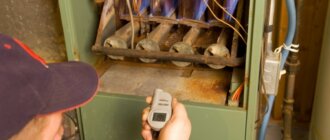3 Ways to Turn Off Your AC When It Won’t Stop Running
Are you frustrated with your AC unit constantly running, even when it should be turning off? Not only is this a nuisance, but it can also lead to potential risks for your home and wallet. Fortunately, there are several solutions that can help turn off your AC when it won’t stop running. In this article, we will explore three effective methods: the manual reset, circuit breaker solution, and calling a professional HVAC service provider. We’ll also provide some preventive measures to avoid this issue in the future. Keep reading to learn more!
Why Your AC Might Not Stop Running
There can be several reasons why your AC unit won’t stop running, and it’s essential to identify the root cause before taking any action. One of the most common causes is a dirty air filter that restricts airflow, causing the system to work harder than necessary. Another reason could be an issue with the thermostat, which may not be calibrated correctly or could have malfunctioned.
Another possible culprit behind your AC unit’s constant operation is low refrigerant levels. Refrigerant absorbs heat from indoor air and transfers it outside, so if there isn’t enough refrigerant in your system, it will struggle to cool down your home effectively. Additionally, a faulty compressor or condenser fan motor can also prevent your AC from shutting off.
It’s important to note that letting your AC run non-stop can lead to significant damage and potential risks such as frozen coils or overheating of components in extreme cases. Therefore identifying these issues early on is crucial for preventing costly repairs down the line.
Common Reasons
There are several reasons why your AC unit might not stop running. Identifying the cause of this issue can help you decide on the appropriate solution. One common reason is a dirty air filter, which could restrict airflow and make it difficult for your AC to cool down your home properly.
Another possible culprit is a malfunctioning thermostat. If your thermostat is not calibrated correctly or has faulty wiring, it could send incorrect signals to your AC unit, causing it to run continuously.
A refrigerant leak could also be causing your AC unit to work overtime. When there’s a leak in the system, there will be less refrigerant available to cool down the air inside your home, leading to prolonged operation times.
Additionally, problems with the condenser coils or blower motor could force an overworked system that won’t shut off. These components require regular maintenance and cleaning as they play crucial roles in keeping your AC running smoothly.
By understanding these common causes of an operating HVAC system that won’t turn off, you’ll have a better idea of how to diagnose and address any issues that arise with proper care and attention before reaching out for professional assistance.
Potential Risks
When your AC won’t stop running, it’s important to take action to prevent any potential risks. One of the biggest risks is an increased risk of wear and tear on your AC unit. When your unit runs continuously without shutting off, it can cause the motor and other components to overheat or break down.
Another risk is an increase in energy consumption which can lead to higher electricity bills. Your AC will consume more energy than necessary when it runs nonstop, leading to a significant waste of resources and money.
In addition, if you have pets or small children at home who might accidentally touch or damage the unit during its continuous operation, there is a possibility that they could get injured as well. This is why taking immediate action when you notice that your AC won’t stop running is crucial for keeping everyone safe.
By addressing the issue promptly and correctly turning off your AC using one of the methods outlined in this article, you can avoid these potential risks altogether. Remember that prevention is always better than cure!
Manual Reset Step-by-step Guide
If your AC unit won’t stop running, a manual reset might be the solution you need to fix it. This method involves resetting the electrical components of your system and is relatively easy to do. Here’s a step-by-step guide on how to perform a manual reset:
- Turn off your AC unit completely by switching off its power at the thermostat or circuit breaker.
- Locate the access panel on your air conditioner and remove it carefully.
- Look for a small red button called the “reset” button which is typically located near the motor/compressor.
- Press and hold this button down for about 30 seconds before releasing it.
- Replace the access panel and turn back on power supply.
It’s important to remember that this method should only be used if all other troubleshooting methods have been exhausted as there are potential risks involved with manually resetting an air conditioning unit, such as electric shock or damage to internal components.
Always exercise caution when performing any maintenance tasks yourself and if in doubt, call in professional HVAC help instead!
When to Use This Method
Knowing when to use each method for turning off your AC is crucial in preventing any potential damage and ensuring that your unit operates efficiently.
One method you can use is the manual reset, which involves resetting the power supply of your AC. This should only be done after checking if there are no problems with the thermostat or air filter. If these components are not causing the issue, then a manual reset may be necessary.
Another option is using the circuit breaker solution, which involves going to your home’s electrical panel and locating the switch that controls your AC unit. Again, this should only be done after ruling out other possible causes for why your unit won’t stop running.
However, it’s important to note that both of these methods should only be used as a last resort before calling a professional HVAC technician. Attempting DIY fixes without proper knowledge could lead to further complications or even pose safety risks.
Ultimately, knowing when to use each method requires some troubleshooting skills and understanding of how an AC system works. If you’re unsure about what steps to take next, it’s always best to seek help from qualified professionals who have years of experience dealing with similar issues.
Circuit Breaker Solution Step-by-step Guide
Is your AC unit still running non-stop even after performing a manual reset? Then, it might be time to try the circuit breaker solution. This method is another simple and easy fix that you can do on your own without any professional help.
Firstly, locate your home’s electrical panel or circuit breaker box which is usually found in the basement or garage. Look for the switch labeled “air conditioner” or “AC” and turn it off. Wait for at least 5 minutes before turning it back on again.
If this doesn’t solve the problem, try resetting other switches in the panel as well, including those labeled “main” and “blower.” Make sure to wait for a few minutes before switching them back on.
Before attempting this solution, make sure that you are familiar with your home’s electrical system to avoid any accidents. If you’re not confident with handling electricity, don’t hesitate to call a professional HVAC technician instead.
Remember that prevention is always better than cure. To keep your AC from continuously running beyond its capacity, regularly clean or replace air filters every month and schedule annual maintenance checks by an experienced HVAC technician.
By following these simple steps and preventive measures mentioned above, you can save yourself from costly repairs while ensuring optimal performance of your AC unit all year round!
When to Use This Method
Knowing when to use a particular method to turn off your AC can save you time, money, and even prevent further damage to your unit.
The first method, manual reset, should only be used if the AC is not turning off due to an electronic fault or malfunction. This can be identified through error codes displayed on the thermostat or control panel of the unit. If there are no errors shown but the AC won’t stop running, then this is not the appropriate solution.
On the other hand, if there is a power interruption in your home and it causes your AC system to malfunction and continue running non-stop without any cooling effect within 30 minutes of troubleshooting guide try out; then the circuit breaker may work for you.
It’s important to note that manually resetting or flipping breakers too frequently could cause additional problems with your system. Therefore it’s best left as a last resort option after all troubleshooting guides have been exhausted.
If neither of these methods works for you, then calling a professional HVAC technician will be necessary. An expert will provide better insights into why such issues arise in air conditioning systems and how they can properly address them.
In addition to fixing immediate problems with your unit, preventive measures such as routine maintenance checks by experts can ensure that similar malfunctions don’t occur again in the future while prolonging the lifespan of AC units overall performance.
Calling a Professional
If you have tried the manual reset and circuit breaker solutions, but your AC unit still won’t stop running, it might be time to call a professional HVAC technician. While DIY methods can save you money, attempting more complex repairs without proper training can put your safety at risk.
Professional help may be necessary if your AC system is experiencing issues with its wiring or motor components. Additionally, if you are not comfortable working around electrical systems or do not have access to specialized tools required for repair work, calling a professional is recommended.
When selecting an HVAC service provider, look for companies that are licensed and insured. You should also consider their experience in handling similar issues and read reviews from past customers to gauge their reliability and quality of work.
While it may be tempting to choose the cheapest option available, keep in mind that subpar repairs could lead to long-term damage or even require costly replacement down the line. Investing in quality repairs now can save you money in the long run by extending the lifespan of your AC unit.
Remember that regular maintenance checkups can prevent many problems from occurring altogether. Consider scheduling annual tune-ups with a reputable HVAC company so that potential issues are caught early before they turn into major repairs requiring professional attention.
Why Professional Help Might Be Necessary
When your AC unit won’t stop running, it can be a frustrating and stressful situation. While there are some DIY methods you can try to resolve the issue, sometimes professional help may be necessary.
One reason why professional help might be necessary is because of the complexity of AC units. HVAC systems have many intricate components that require specialized knowledge to diagnose and repair properly. Attempting to fix an issue without proper training and experience could lead to further damage or even personal injury.
Another reason why calling in a professional may be necessary is due to potential safety risks involved with handling electrical components. Working with electricity requires specific precautions and expertise, which professionals have been trained for extensively.
Moreover, if your AC unit keeps running despite trying all possible troubleshooting methods, it’s time to call in an expert who can identify the root cause of the problem accurately. A licensed HVAC technician has access to advanced diagnostic tools that will make identifying issues easier than ever before.
While attempting DIY repairs on your air conditioning system might initially seem like a cheaper option – especially when compared with hiring HVAC experts – getting professional help is undoubtedly worth it for long-term peace of mind and safety concerns.
How to Choose a Good Service Provider
Choosing a good service provider for your AC unit can be a daunting task, but it’s important to make sure you choose the right one. Here are some tips to help you find a reliable HVAC technician.
Firstly, look for certifications and licenses. A reputable technician should hold relevant certifications and state licenses that demonstrate their expertise in the field. Check if they have been certified by organizations like NATE or ACCA.
Secondly, consider their experience level. Look for technicians who have been in the industry for several years as they would likely have gained more knowledge and expertise over time.
Thirdly, check their reviews online. Customers’ feedback on social media platforms like Yelp or Google Reviews gives insight into how previous customers felt about their services.
Ask them about warranties and guarantees offered with their services before choosing them as your go-to HVAC contractor. This will ensure that any future issues related to the repair job done by them are taken care of without hassle.
These factors can aid you in finding a reliable service provider that saves your money while ensuring that your AC unit is functioning optimally throughout its lifespan.
Preventive Measures
Preventive measures are essential to maintaining the good condition of your AC unit and avoiding malfunctions. One of the easiest things you can do is clean or replace your air filters regularly. Dirty filters can cause your AC to work harder than usual, which could lead to a breakdown.
It’s also important to have an annual maintenance check-up by a professional HVAC technician. They will inspect the unit thoroughly, clean its parts, and check refrigerant levels if it’s still efficient. This way, any minor issues can be detected early on before they become major problems.
Keep in mind that proper insulation is crucial for maintaining cool air inside your home efficiently without putting too much strain on your AC system. Make sure all doors and windows are closed tightly when you’re using the AC so that no outside hot air enters.
Monitor the thermostat settings closely as keeping them at low temperatures consistently may damage your cooling system over time while increasing energy bills unnecessarily. By following these preventive measures, you’ll not only extend the lifespan of your HVAC system but also save money in the long run!
Conclusion:
A malfunctioning AC unit can be frustrating and uncomfortable, especially during the hot summer months. When your AC won’t stop running, it’s important to take action as soon as possible to avoid potential risks such as damage to your system or increased energy bills.
While you can try manual reset or circuit breaker solutions on your own, if you’re not comfortable handling electrical components or if the issue persists after attempting these methods, it’s best to call in a professional HVAC technician for assistance.
Remember that regular maintenance and preventive measures such as changing filters and cleaning coils can help prevent issues from arising in the first place. By taking care of your AC unit and addressing any problems promptly, you can ensure that it continues to keep you cool and comfortable all season long.



